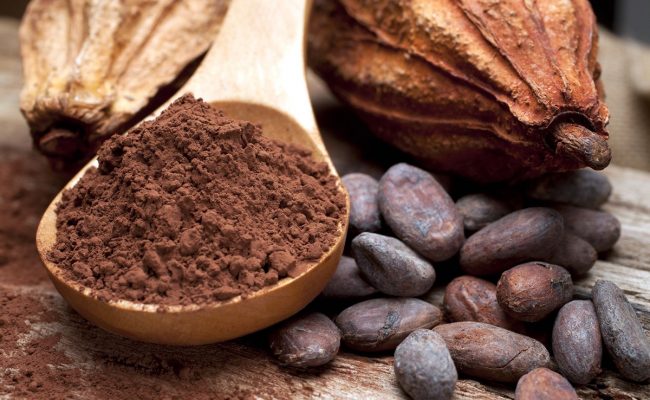
Chocolate has been publicized in the media as a healthy indulgence because cocoa intake has been associated with heart health benefits, may help promote the release of serotonin in the brain and dark chocolate is considered a good antioxidant source.
Dark chocolate has the highest amount of cocoa and is considered the healthiest option for chocolate.
In general, for the highest health benefit, Harvard Health suggests choosing chocolate that is at least 70% cocoa or higher (1).
Pure dark chocolate is naturally lower in carbohydrates compared to other sweets. An ounce of dark chocolate provides about 9 grams of fat (13% DV), 17 grams of carbohydrate (5% DV), 1.4 grams of protein (2% DV).
Milk chocolate or chocolate based sweets have added sugars which mean they will not be considered low in carbohydrates.
Cocoa can be considered a nutrient dense food because along with providing antioxidants, cocoa is also a source of iron, copper, magnesium and zinc.
Therefore, if you want the biggest health benefit from cocoa, focus on eating a small amount of dark chocolate that hasn’t been sweetened.
Antioxidants
All natural plant foods can provide dietary antioxidants.
For example, fruits, vegetables, legumes and spices are all good sources of plant compounds called flavonols or antioxidants.
Eating a diet high in antioxidants may help lower risk for certain chronic diseases. Incorporating dark chocolate or cocoa into your diet can also provide a good antioxidant source.
According to a 2011 article (2), researchers compared cocoa and cocoa powder to fruits commonly referred to as super foods.
Researchers concluded cocoa powder and dark chocolate had the same or higher measurements of antioxidant function compared to fruit juices or powders tested.
Researchers also suggest they may fall into the category of super foods although this term doesn’t have an exact definition.
Heart health
One of the most associated health benefits of low carbohydrate dark chocolate has to do with cocoa’s positive effect on heart health.
Observational studies have shown regular intake of cocoa is associated with lower cardiovascular mortality.
Short term studies have also found cocoa to have a lowering effect on blood pressure.
A 2007 study (3) in the Journal of American Medical Association found dark chocolate intake reduced systolic and diastolic blood pressure in study participants who were consuming dark chocolate consistently over 18 weeks.
This effect of lowered blood pressure occurred without any significant changes in body weight.
Cocoa is a source of antioxidants which may help protect cells from damage. As a result, this may help lower risk for cardiovascular disease and other chronic diseases.
Besides providing antioxidants, cocoa is a source of nitric oxide. When nitric oxide is digested, absorbed and metabolized, it can act as a vasodilator.
This is why cocoa and dark chocolate may have a positive effect on blood pressure.
Low sugar
Unprocessed cocoa powder and minimally processed dark chocolate can be considered lower in carbohydrates.
They also can contain no added sugar making them a natural low sugar indulgence. However, chocolate products can often have added sweeteners in them.
The higher the cocoa percent, the potential greater health benefit. However, the higher the cocoa percent, the more bitter the chocolate will be.
Consuming a small amount of dark chocolate, about one ounce, can provide a sense of satisfaction without contributing added sugars.
Don’t automatically assume dark chocolate it low in carbohydrates because manufacturers can add sweeteners to dark chocolate to make it more palatable.
If it’s hard for you to enjoy the taste of dark chocolate, start at a lower percent like around 55-60% cocoa.
Gradually work up to a higher cocoa percent around 70-85%. The more you get used to consuming dark chocolate, the more you can enjoy it.
Brain boosting
A 2016 study (4) investigated the chocolate had on cognitive function. Researchers adjusted for cardiovascular, lifestyle and dietary factors in 968 participants.
Researchers found habitual chocolate intake was associated with cognitive performance. Higher chocolate intake was associated with better test scores analyzing cognitive function and memory.
More research is needed in this area, as there is much to clarify with chocolate intake and cognitive function.
A 2016 article (5) in The Washington Post suggests other studies have also found a positive effect from chocolate on brain function.
It is thought the cocoa flavones and a compound in cocoa called methylxanthines are responsible for possibly boosting brain health and function.
Calming effect of dark chocolate
It can be a common assumption or belief that consuming chocolate can improve your mood.
In fact, some research (6) from rats does suggest chocolate may provide some anti-depressant effect in the brain.
Chocolate can work in the brain to release certain hormones that influence mood. Consuming a small amount of chocolate may help provide a boost in mood, but relying on consuming chocolate to regulate your mood is not a healthy cycle.
Food in general can be used in times of emotional stress and unstable mood which can increase risk for obesity.
How much chocolate should you eat?
With all the health benefits dark chocolate or cocoa can provide, it may seem reasonable to think the more chocolate the better.
However, only a small amount of dark chocolate per day is needed and recommended for consumption.
A typical recommendation is for eating about an ounce of dark chocolate most days.
Chocolate is nutrient dense, but it is also calorically dense. Therefore, consuming excess chocolate, even if it is dark chocolate, may increase risk for weight gain.
The best way to eat dark chocolate is slowly so you can enjoy it. That can bring a high level of satisfaction from a relatively small piece of chocolate.
Eating dark chocolate in place of other higher calorie, higher sugar sweets can be helpful to curb your sugar intake.










